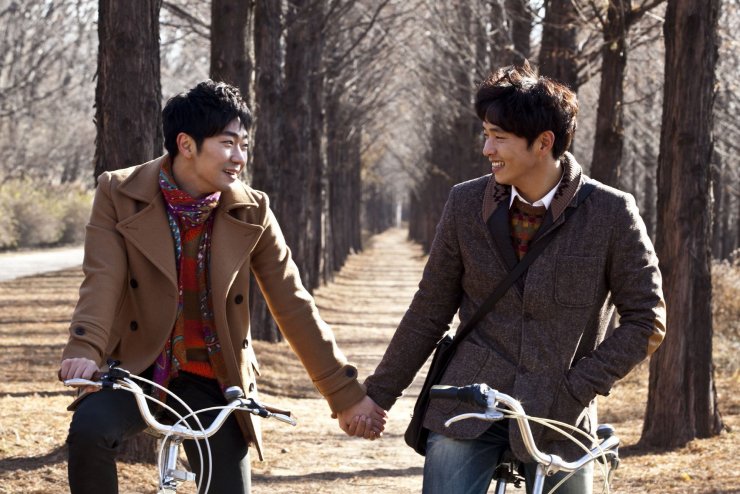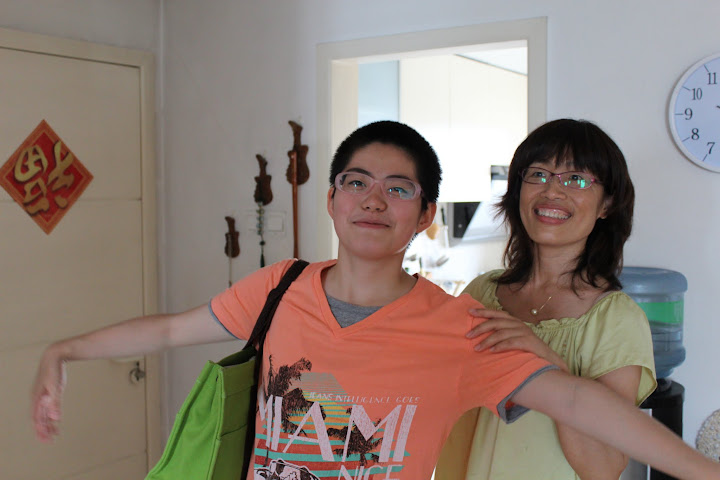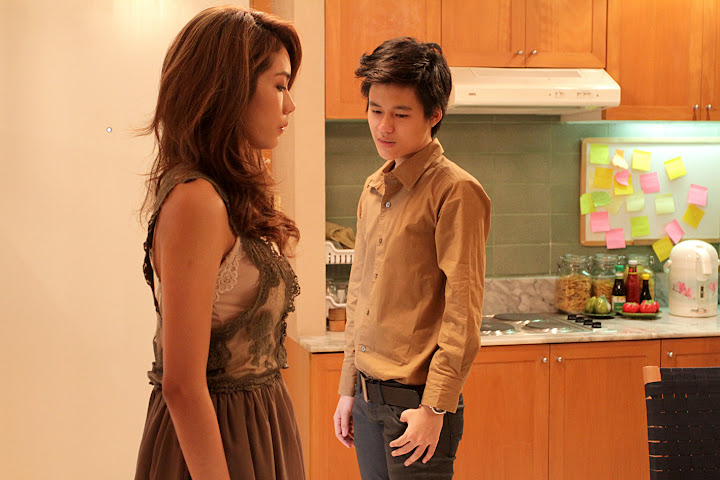Saturday, June 8, 2013
The 37th San Francisco International LGBT Film Festival (Frameline37)
 That "us" means you and me, and everyone else. Frameline37
certainly reflects that point in this year's programming.
That "us" means you and me, and everyone else. Frameline37
certainly reflects that point in this year's programming.
To bring us together, this year's festival curates 238 films from 27 countries, including 82 features and 155 shorts, out of more than 800 submissions. These numbers are quite impressive when most other major festivals in the City have been scaling back recently. Even more impressive is that the ticket prices remain unchanged from last year! However, many films are shown only once, you should make sure not to miss them if you are interested. Plus, many of these films are unlikely to be shown in a theater near you in the future.
Last year, I was delighted by Frameline36's changing of heart for selecting more queer Asian cinema — I call them gaysian films. I am thrilled to see that not only this direction doesn't fade away, but also it gets expanded into a spotlight at this year's festival — Frameline37 presents 29 gaysian films that reflects Asian and Asian American LGBTQ community.
Frameline's shorts programs have been strong and extensive over the years. Every year the traditional "Fun in Boys Shorts" and "Fun in Girls Shorts" always entertain the festival goers with crowd pleaser comedies. It's no exception this year. However, I am really impressed by the superb quality of the short films in this year's "Worldly Affairs" — a fine collection of foreign gay short films, which you probably won't be able to see anywhere again after the single Friday, June 28, 4:00PM screening at the one and only historical Castro Theater.
Here are a few (mostly gaysian) feature films I have seen at this year's festival. As always, each film title is linked to the festival program, where more details about the film including showtime and venue information during the festival can be found. Each film's still image is linked to a film's official Web site if it's available. In random order:
- Will You Still Love Me Tomorrow? (明天記得愛上我 | Taiwan 2013 | in Chinese | 104 min.)
- Two Weddings and a Funeral (두 번의 결혼식과 한 번의 장례식 | South Korea 2012 | in Korean | 106 min.)
- It Gets Better (ไม่ได้ขอให้มารัก | Thailand 2012 | in Thai | 103 min.)
- White Night (백야 | South Korea 2012 | in Korean | 75 min.)
- Mama Rainbow (彩虹伴我心 | China 2012 | in Chinese | 80 min. | Documentary)
- She: tHEiR Love Story (She เรื่องรักระหว่างเธอ | Thailand 2012 | in Thai | 90 min.)
- Soongava — Dance of the Orchids (सूनगावा | Nepal 2012 | in Nepali | 85 min.)
- Bwakaw (Philippines 2012 | in Filipino/Tagalog | 110 min.)
-
Will You Still Love Me Tomorrow?
(明天記得愛上我
| Taiwan 2013 | in Chinese | 104 min.)
After his delightful feature debut "Au revoir Taipei" (一頁台北, 2010), director Arvin Chen (陳駿霖) returns to the Bay Area with his beautiful sophomore feature "Will You Still Love Me Tomorrow?" The film will be screened as part of the showcase at the festival.
The film's protagonist is a quiet family guy Wei-chung (Ren Richie 任賢齊) who manages an eye-glass shop. After he repressed his homosexual desire, he has been married for nine years to A-feng (Fan Mavis 范曉萱) and they have an adorable son. However, after a handsome customer comes to the store, he can no longer holds back his true feeling and his life becomes topsy-turvy. Meanwhile, Wei-chung's sister Mandy (Hsia Kimi 夏于喬) deals with her nerves-breakdown before she marries to Shan Shan ( Stone 石頭, the guitarist of the legendary Asian rock band Mayday 五月天).
While a few colorful characters in the film generate plenty comical moments, director Arvin Chen impressively remains his focus on his absorbing narrative and brilliantly brings out the warmth from his characters. The story unfolds in a comfortable pace with a soothing melody, which invokes my nostalgia memory about Edward Yang's (杨德昌) films.
What's even more remarkable is that all the characters in the film are likable. They are super kind and genially good-hearted, and they are delicately gentle to each other. They remain calm and never lose the faith and hope about love even when they are facing crisis.
This film stands out as a must-see at Frameline37.
Click here to go back to the list of titles
-
Two Weddings and a Funeral
(두 번의
결혼식과 한 번의
장례식 | South Korea 2012 | in Korean |
106 min.)
Director Kim Jho Gwang-soo's (김조광수) hilarious "Two Weddings and a Funeral" has little in common with the British comedy "Four Weddings and a Funeral" (1994) besides mocking its title. The film is extremely campy with a few terrific scene-stealing supporting characters.
Min-soo (Kim Dong Yoon 김동윤) is a handsome closeted young gay doctor. Under social and family pressure, he phonily gets married to his lesbian co-worker Hyo-jin (Ryoo Hyeon-kyeong 류현경), who sleeps in an apartment next door with her girlfriend. Although Min-soo has a circle of supportive and energetic gay friends to hang out with, he mostly lives on the edge to hide his gay life from his parents and his coworkers. That double life takes a heartbreaking turn when the secret eventually leaks out.
Being gay himself, director Kim Jho Gwang-soo undoubtedly understand Korean gay subculture well and infuses it vividly in his story and his characters. The group of gay men in the film can be easily identified with in real life.
Come to see this film with a group of your own friends, then after wards you can point out which friends of yours are "top-bottom" or "bottom-top."
Click here to go back to the list of titles
-
It Gets Better
(ไม่ได้ขอให้มารัก
| Thailand 2012 | in Thai | 103 min.)
It's a well-known fact that "ladyboy" has become one of Thailand's main tourist attractions. Director Tanwarin Sukkhapisit's (ธัญญ์วาริน สุขะพิสิษฐ์ไม่ได้ขอให้มารัก) eye-pleasing drama "It Gets Better" seems to go one-step further: you hardly see any female character in the film who is not a transgender woman, or ladyboy as they call themselves in the film; and most straight men can't help but hitting on them.
The film tells three parallel stories about love, desire, and sacrifice for pursing happiness. After his transgender father passed away, strikingly handsome Tonmai (Panupong Waraakesiri) comes back to Thailand from the United States to handle the future of The Fountain, a ladyboy club left by his father. Upon his arrival, he wastes no time and immediately falls for Tonlew (Bell Nuntita), then he flips when he finds out that Tonlew is a ladyboy. However, another husky young man Fai (Kawin Imanothai) doesn't mind to take in a middle aged transgender woman Saitarn (Penpak Sirikul) as his new lover, right after he breaks up with his girlfriend. Meanwhile, a feminine young boy Din (Pavich Suprungroj) falls in love with his handsome master after Din's father send him to a temple to be a monk.
The three stories seem abstractly intertwined, as if one character might have been a transformation from one to another, because the film seems purposely to be ambiguous about details of each story.
Unfortunately, none of the story seems convincing or plausible. It's too bad the film's lush images of gorgeous landscape and beautiful people are only props for stories that deepen stereotype about Thailand's ladyboy culture.
Click here to go back to the list of titles
-
White Night
(백야 | South Korea 2012 | in Korean | 75 min.)
Director Leesong Hee-il (이송희일) is known for his feature directorial debut "No Regret" (후회하지 않아 2006), which is groundbreaking for Korean queer cinema. His new film "White Night" emphasizes more on character's rage and swinging mood than on the thin narrative.
Moody flight attendant Won-gyoo (Won Tae-hee 원태희) comes back to Seoul after two years living overseas. He meets up with Tae-joon (Lee I-kyeong 이이경) through an online hookup site for a one-night-stand before he takes off again in the morning. However, he constantly changes his mind which drives Tae-Jun away repeatedly. Yet, somehow they are unable to drift apart, even Tae-Jun rides motorcycles and Won-gyu drags his luggage on foot, they can always catch one another. Go figure.
This drags on whole night on the streets in Seoul, and the Korean drama lingers between the two. If you like moody guys chain-smoking in the dark, you might enjoy this film. It's bed time for me if it's not for these two characters.
Click here to go back to the list of titles
-
Mama Rainbow
(彩虹伴我心 |
China 2012 | in Chinese | 80 min. | Documentary)
Perhaps the first film ever about parents of gays and lesbians in China, director Fan Po-po's (范坡坡) refreshing documentary "Mama Rainbow" features outgoing and supportive parents in five major cities in China. Contrary to the mainstream culture and deeply rooted traditions, these extraordinary parents embrace their gay and lesbian children and candidly express their love and compassion toward their gay children.
In Beijing, Dian Dian's mom Huanglin treats Dian Dian's girlfriend Yuexi like her own daughter, and they happily live together even when Dian Dian studies in Hong Kong. Huanglin and Yuexi's mom Meiyi even envy their daughter's love. In Shanghai, Wugui's mom, Sister Mei as called by the local gay community, feels so lucky that her son can think ahead of her regarding her makeup and jewelries before they get out the house. In Fuzhou, Zhang Lingxuan's mom becomes much closer to her son after his coming out. In Guangzhou, Yuantao's 65-year-old mom Wu Youjian creates Youjian Studio and gives lectures at Universities promoting acceptance for gay and lesbian. Finally in Nan Ning, Mama Jesemi shows her brave support to her child.
These courageous moms from various backgrounds are pioneers in providing loving support to gay and lesbian children. They understand that the first step is to understand their children, but that's not enough. They go one step further by standing up for their children and by sounding the voice of the less visible gay and lesbian community in China.
This light hearted and delightful film qualifies as a milestone that puts a human face for the parents of millions of gay and lesbians in China.
Click here to go back to the list of titles
- She:
tHEiR Love Story
(She เรื่องรักระหว่างเธอ
| Thailand 2012 | in Thai | 90 min.)
With an elevator music that is played too loud in the background, director Sranya Noithai's (สรัญญา น้อยไทย) sappy drama "She: tHEiR Love Story" tries very hard in hoping to invoke some emotion with its implausible lesbian love stories. It fails miserably.
Magazine columnist Da (Apassaporn Saengthong) needs to finish an assignment on lesbian love. Since she is straight, she conveniently turns to her tomboy next-door neighbor Be (Kitchya Kaesuwan) for help. Yup, you guess it right, next thing you see, they fall in love! Meanwhile, a parallel love story is about a middle aged woman Bua (Penpak Sirikul) falls for a young photographer June (Ann Siriwan Baker).
If this were indeed a daytime soap opera, you probably would already change the channel or turn off the television. But then you would have missed the tears from these characters, or are they just eye drops? And, by spelling "Their" as "tHEiR" in the title doesn't make the film any cuter or hipper, but definitely stranger.
Click here to go back to the list of titles
- Soongava
— Dance of the Orchids
(सूनगावा | Nepal
2012 | in Nepali | 85 min.)
Nepali director Subarna Thapa's yawning melodrama "Soongava — Dance of the Orchids" tells a forbidden love story between two lesbian college friends.
Traditional Nepali dance teacher and performer Diya (Deeya Maskey) is about to marry to a man arranged by her parents, but she notices and accepts the attraction from her college friend Kiran (Saugat Malla). Against the prejudice from the society and family, they move in together. There is no doubt that a happy-ever-after fairy tale is not going to happen here.
The thin, predictable, sometimes absurd plot provides little room for the two fine actresses to exhibit their potential. The two main characters never go deeper than their skin. This film is claimed to be the first Nepali film about lesbian love, but that doesn't give it holds a free pass to take a shortcut with its story and characters.
Click here to go back to the list of titles
-
Bwakaw
(Philippines 2012 | in Filipino/Tagalog | 110 min.)
In the past, Filipino films at Frameline have been predominated by erotic male dancers, which is nothing wrong about it. But the only Filipino film at this year's Frameline is completely different and a refreshing change of scene.
Selected as Philippine's Oscar entry for the Best Foreign Language film last year, director Jun Robles Lana's award-winning drama "Bwakaw" superbly crafts a heartfelt character, outstandingly played by 84-year-old legendary Filipino actor Eddie Garcia.
Bwakaw is the name of a dog who becomes the company of an ailing elderly gay man Rene (Eddie Garcia), who lives alone in a shabby house. He is grumpy toward pretty much everyone around him. He senses nothing much left for him and he revises his will constantly according to events around him. However, that doesn't mean that he is giving up on love — both longing for love and giving love to others, especially toward his beloved dog.
Although the subject matter of this touching film seems poignant and melancholy, the film is often surprisingly funny. Director Jun Robles Lana not only terrifically creates an in-depth protagonist, but also several lively supporting characters. It's really impressive to see how he turns a disgruntled old man into an adoring character with a tender heart.
Frameline37 runs June 20-30, at Castro Theater (429 Castro Street), Roxie Theater (3117 16th Street), Victoria Theater (2961 16th Street) in San Francisco, and Rialto Cinemas Elmwood (2966 College Avenue) in Berkeley.
Labels: frameline, frameline37, framline 2013







